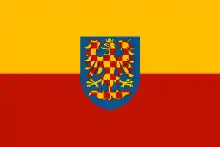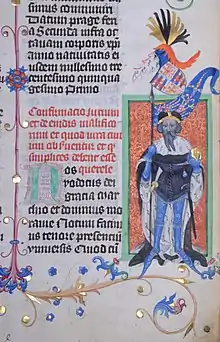Flag of Moravia
An official appearance of the flag of Moravia, unlike the provincial Moravian coat of arms, does not exist, because such a flag has never been granted to Moravia. However, there are several documented variants of Moravian flags used in the past. The first recorded version dates from the mid-13th century.[1]
 | |
| Use | Other |
|---|---|
| Design | Historical flag of Moravia (the heraldic flag with Moravian Eagle), recommended by Czech Vexillological Society |
 | |
| Use | Other |
|---|---|
| Design | Flag of Moravia as bicolor with gold-red checked eagle (from 2007), by Moravian National Community |
The oldest history
There is a description of a Moravian flag in the chronicle of Ottokar aus der Gaal (also known as Otacher ouz der Geul or Ottokar von Steiermark; born about 1265, died between 1318 and 1322): Die Steirische Reimchronik.[2]

The history of the Moravian flag is very varied and begins in the 13th century in the context of the relations between Bohemia and Moravia organized within the construction of a centralized monarchy by the last kings of the Přemyslid dynasty. The colouring of the flag (or banner) was according to vexillological rules derived from the colours of heraldic coats of arms since the Middle Ages.[1]

From the reign of Ottokar II of Bohemia, Moravia's coat of arms features a silver-red checquered eagle with a golden crown and claws, which looks to the right and is placed on a blue field.
The oldest surviving full-colour depiction of the coat of arms of Moravia is in a fresco in the hall of Gozzoburg Castle in Krems an der Donau, dating to the early 1270s.[5] The checquered eagle is documented in a depiction from 1286 and later in the late 13th and early 14th century.[6]
The colours of the chequered eagle were derived from the colours of the Bohemian lion (a silver lion on a red shield) and express the connection with the Bohemian king of Moravia and Bohemian monarchy, as, for example, historian Vladimír Růžek recalls.[7] One of the first documented illustrations of the banner of Moravia is the view in the 1407 Gelnhausen Codex, which depicts the Moravian Margrave Jobst of Moravia with a blue banner on which the Moravian white and red eagle is placed with a yellow crown and yellow armor without a shield.[1]
Modern age
_Polychromie.jpg.webp)
The heraldic flag of Moravia (the flag of Moravia in the form of the flag with coat of arms) is described and drawn for example in the work of Jacob Koebel: Wapen des heyligen römischen Reichs teutscher Nation from 1545.[8]
Historically, there were several versions of the widely used and documented Moravian flags, which were mainly used during the 19th century in parallel to bicolours and tricolours derived from tinctures of provincial coat of arms.[9][10] According to some authors, therefore, the Moravian flag consists of three horizontal strips of red, white, and blue.[11] This color combination was the flag of the Moravian patriots in the 19th century. A delegation of the Moravians to the Slavonic Congress in Prague in 1848 allegedly marched under a tricolour with the top horizontal stripe white, the middle red and the bottom blue.[12] White, red and blue colors are referred to as Moravia in the Nový prostonárodní popis Čech, Moravy a Slezska from 1854 and in some textbooks from the 19th century.[13] According to Ivan Štarha, the Moravian colours in 1915 were white, red and blue, and between the years 1915 and 1918 yellow, red and blue.[14][15] The Czechoslovak Republic restored the white or silver color to the Moravian coat of arms, but the color is not defined in the provincial status flags / banners Act No. 252/1920. Country flag do not know the later legal regulations (Act no. 269/1936, Law no. 222/1939, no. 163/1960, and now valid Acts no. 3/1993 Coll., No. 352/2001 Coll.).[16][17][18]
Today, a yellow-red bicolour is sometimes used as the flag of Moravia, especially by some Moravian parties, associations and other organizations.[19][20] The yellow-red bicolour has been used along with other bicolours and tricolours since the second half of 19th century, according to certain authors (L. E. Havlík, M. Hlinomaz).[12][21]
Hereinafter referred to as Morava: k státoprávnímu postavení země v průběhu věků.[9][22] As stated by M. Hlinomaz:
Zdá se, že žlutočervený prapor, logicky odvozený od sněmem v roce 1848 přijaté formy šachování moravské orlice, nesl oficiální posvěcení úřady a pro svou podobnost s říšskou vlajkou, i sympatie moravského obyvatelstva německé národnosti.[9]
The historian Ivan Štarha argues that Moravia was never awarded the flag.[13] To today's yellow-red bicolour is sometimes added the provincial coat of arms with a red-gold checquered eagle.[19] The red-gold checquered eagle variant was introduced in 2007, and was recommended by some members and supporters of the Moravian National Community to avoid a possible misidentification with other flags, for example the flag of the capital city Prague, which also consists of yellow and red horizontal stripes. This option is criticized by some Bohemian (Czech) nationalist experts.[23][24][25][26]
Both of these versions, however, have been criticized by certain experts approached by the media (specifically historian M. Řepa, vexillologist K. Müller, and heraldist Jiří Louda).[23][24][25][26]
The appearance of the flag has been a subject of discussion for more than 100 years.[27] One variant consists of two bars, a yellow bar in the upper half, and a red bar in the lower half.

 White-red bicolour used till the beginning of the 20th century
White-red bicolour used till the beginning of the 20th century Red-white bicolour used till the beginning of the 20th century
Red-white bicolour used till the beginning of the 20th century Yellow-red bicolour used simultaneously with other bicolours and tricolours since the second half of 19th century[12]
Yellow-red bicolour used simultaneously with other bicolours and tricolours since the second half of 19th century[12].png.webp) Red-yellow bicolour: another historical flag of Moravia coming from the second half of the 19th century or the beginning of the 20th century
Red-yellow bicolour: another historical flag of Moravia coming from the second half of the 19th century or the beginning of the 20th century.png.webp) One version of the flag of Moravia in the form of red-white-blue tricolor, allegedly used by the deputies of Czech-speaking Moravians to the Slavonic Congress in Prague in 1848[12]
One version of the flag of Moravia in the form of red-white-blue tricolor, allegedly used by the deputies of Czech-speaking Moravians to the Slavonic Congress in Prague in 1848[12]
.png.webp) Red-blue-white tricolour used in the 19th century and early 20th century
Red-blue-white tricolour used in the 19th century and early 20th century
See also
References
- Růžek, Vladimír (2013). "Cesty k definici (nejen) moravského znaku a praporu". Veřejná správa, No. 10 (in Czech). pp. 20–22:22. ISSN 1213-6581.
- Pícha, František (2013). "Znaky a prapory v kronice Ottokara Štýrského". Brno: Česká vexilologická společnost. pp. 3320–3324.
- {{cite web
| title=Ottokars Österreichische Reimchronik (MGH Deutsche Chroniken V,1)
| url=http://daten.digitale-sammlungen.de/~db/bsb00000779/images/index.html?id=00000779&groesser=&fip=193.174.98.30&no=&seite=226
| access-date=2017-06-25}} - {{cite web
| title=Ottokar von Steiermark: 'Steirische Reimchronik'
| url=http://www.handschriftencensus.de/werke/602
| publisher=www.handschriftencensus.de
| access-date=2017-06-25}} - Krejčík, Tomáš; Pícha, František (2009). "Český a moravský znak ve znakové galerii v Gozzoburgu v Kremsu" (in Czech). 13 (28). Brno. pp. 49–57. ISSN 0862-8963.
- Vojtíšek, Václav (1921). Naše státní znaky (staré a nynější) (in Czech). Praha: Vesmír. p. 21.
- Růžek, Vladimír (2013). "Cesty k definici (nejen) moravského znaku a praporu" (PDF). Veřejná správa (in Czech) (10). pp. 20–22: 21. ISSN 1213-6581.
- Koebel, Jacob (1545). "Wapen des heyligen römischen Reichs teutscher Nation" (in German). Frankfurt am Main. p. 14. Retrieved 2017-06-29.
- Hlinomaz, Milan (1995). "Ke státní a zemské symbolice českého státu v období 1526–1918" (PDF). Paginae historiae. Sborník Národního archivu (in Czech) (3): 152–194. ISSN 1211-9768. Archived from the original (PDF) on 2015-04-02. Retrieved 2015-03-07.
- Ke státní a zemské symbolice českého státu v období 1526–1918, p. 167th
- Brožek, Aleš (2003). Lexikon vlajek a znaků zemí světa. Praha: Kartografie. p. 50. ISBN 8070117761.
- Havlík, Lubomír Emil (1990). Symboly moravské identity (PDF). Moravskoslezská orlice (in Czech). p. 12.
- Štarha, Ivan (2002). "Pocta Janu Janákovi. Předsedovi Matice Moravské, profesoru Masarykovy univerzity věnují k sedmdesátinám jeho přátelé a žáci". In Bronislav Chocholáč; Jiří Malíř (eds.). Moravské barvy a moravská zemská vlajka (in Czech). Brno: Matice Moravská. pp. 165–170: 168. ISBN 80-86488-07-1.
- Štarha, Ivan (2013). Historie, moravské barvy a moravská vlajka (PDF). Veřejná správa (in Czech). pp. 165–170. ISSN 1213-6581.
- Moravské barvy a moravská zemská vlajka, p. 170.
- "Zemský registr erbů České republiky: Legislativa" [The National Coat of Arms Register of the Czech Republic] (in Czech). ZREČR.
- "Sbírka zákonů a mezinárodních smluv České republiky. Zákon České národní rady o státních symbolech České republiky" (in Czech). Wolters Kluwer ČR.
- "Sbírka zákonů a mezinárodních smluv České republiky. Zákon o užívání státních symbolů České republiky a o změně některých zákonů" (in Czech). Wolters Kluwer CR.
- Štarha, Ivan (2002). "I. Správa, právo, politická moc...". Moravské barvy a moravská zemská vlajka. Pocta Janu Janákovi (in Czech). pp. 165–170. ISBN 80-86488-07-1.
- Moravské barvy a moravská zemská vlajka, p. 165.
- Havlík, Lubomír Emil (1990). Morava: k státoprávnímu postavení země v průběhu věků. Brno: Moravské občanské hnutí. p. 31.
- Ke státní a zemské symbolice českého státu v období 1526–1918, p. 168
- Motýl, Ivan (June 2011). "Morava s ilegální vlajkou". Týden (in Czech): 14. ISSN 1210-9940.
- Motýl, Ivan (July 2011). "Jak jsem urazil Moravany". Týden (in Czech): 12–13.
- Štěpán, Petr (July 2012). "Moravskou vlajku vyvěsí téměř 400 obcí. Kvůli sporům není jasné, zda je to ta pravá". iHNed.cz. iHNed.cz. ISSN 1213-7693.
- "Škromach: Že se vyvěšování moravských vlajek čecháčkům nelíbí? Jejich věc". Parlamentní listy (in Czech). Parlamentní listy. July 2012. ISSN 1214-3154.
- Štěpán, Petr (5 July 2012). "Moravskou vlajku vyvěsí téměř 400 obcí. Kvůli sporům není jasné, zda je to ta pravá". Hospodářské noviny (in Czech). iHned.cz.
- Svoboda, Zbyšek; Fojtík, Pavel; Exner, Petr; Martykán, Jaroslav (2013). "Odborné vexilologické stanovisko k moravské vlajce". Brno: Česká vexilologická společnost. pp. 3319, 3320.
- Pícha, František (2013). "Znaky a prapory v kronice Ottokara Štýrského". Brno: Česká vexilologická společnost. pp. 3320–3324.
- Havelka, Jan (1880). "Erb a zemské barvy markkrabství moravského". Komenský (in Czech) (29): 454–455. Retrieved 2015-12-15.
- "O barvách praporů (8. 9. 1888)". Orlice, časopis politický (in Czech). Telč (19): Příloha Orlice k číslu 19. 1888.
External links
 Media related to Flags of Moravia at Wikimedia Commons
Media related to Flags of Moravia at Wikimedia Commons